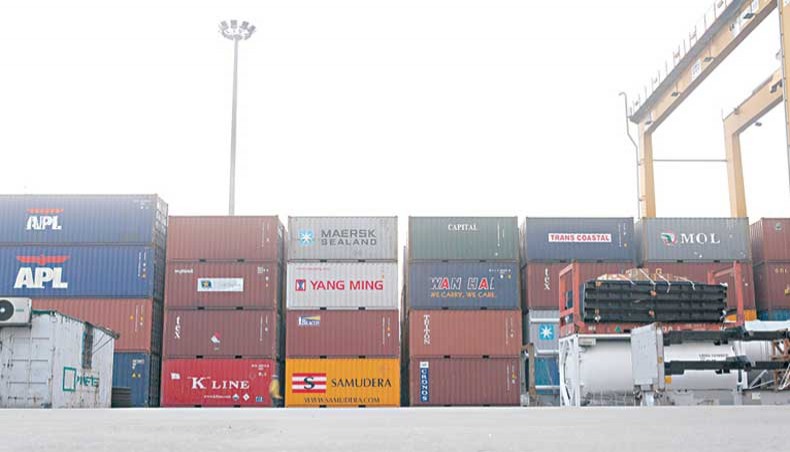
A file photo shows containers in the Chittagong port. The National Board of Revenue has asked the country’s commercial banks to comply with the responsive declaration procedures in opening letter of credit and approving other import-related documents for preventing tax evasion and trade-based money laundering. — New Age photo
The National Board of Revenue has asked the country’s commercial banks to comply with the responsive declaration procedures in opening letter of credit and approving other import-related documents for preventing tax evasion and trade-based money laundering.
Import consignments with incomplete information in the LC documents will face 100 per cent physical inspection and customs commissioners will have the authority to summon the LC issuing bank officials to be present during the inspection.
The customs wing of the NBR on Wednesday issued a set of instructions for the banks to ensure scrutiny of the import documents and requested the Bangladesh Bank governor to inform the banks about the NBR decisions.
Responsive declaration of goods will not only prevent duty evasion and trade-based money laundering but also expedite valuation process thus facilitate international trade, customs officials told New Age on October 12.
Complying with the responsive declaration procedures will also prevent misdeclaration — under invoicing and over invoicing — by importers, they said.
Currently, banks are not precisely following the provisions of Import Policy Order for 2015-2018, Customs Act-1969 and other laws in authorising import invoice, LC authorisation form and LC documents that cause duty evasion and money laundering, they said.
In many cases, import documents including LCA and LCs are found incomplete with lack of required information like reasonable price, detailed description, HS code, generic and commercial name of imported goods, they said.
Under the responsive declaration, banks will have to authorise the import invoice after crosschecking the details of products like generic name, commercial name, brand name, chemical name, HS code, model number art number and part number of import item, according to the NBR instructions.
The details must have to include clearly in the LCA form and the LC documents, the instructions said.
The packing list must be complete with details information of goods including quantity and weight where applicable.
Banks will not authorise any incomplete packing lists, it said.
No change in description and HS code of goods could be bought in the LC without approval of customs commissioner after shipment.
Banks will also verify whether the names and detailed addresses, emails, web addresses and telephone numbers of importer and exporter are provided accurately in the invoice and if necessary, will crosscheck the information before authorising the invoice.
Bankers will also include the details of importers and exporters in the LC documents.
The instructions were issued with the decision of a meeting on prevention of duty evasion and trade-based money laundering held on August 28 at the NBR with customs policy member Md Lutfor Rahman in the chair.
Representatives from Bangladesh Bank, different commercial banks and customs officials attended the meeting.
Officials of the NBR said that Bangladesh Bank would monitor whether the banks are authorising the LCA form, invoice and packing list and other documents as well as issuing LCs in line with the responsive declaration procedures.
Banks are asked to follow the NBR rules and regulations in mentioning the reasonable price of import goods in the LCs.
For goods under sensitive list of the NBR, both the price of weight-based unit and price of piece must be mentioned in the invoice.
Officials said that in many cases banks were authorising the LCA and issuing LCs without mentioning the accurate description and HS code of goods.
Actual transaction prices or reasonable prices of goods are not shown violating the provision of import policy order, they said.
In many LC documents, customs officials find the prices of finished goods shown are lower than the prices of raw materials of those goods.
Such irregularities cause complexities in determining the prices of imported goods for customs valuation and completing the clearance procedures.
Source: New Age

